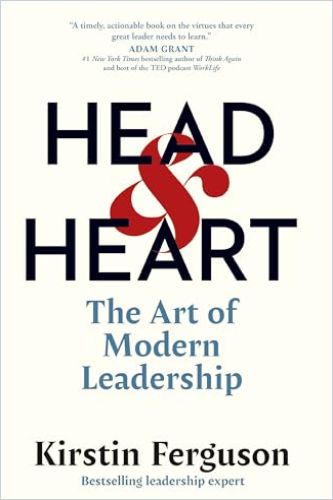Leadership expert Kirstin Ferguson shows you how to combine your conscious rational skills and your soulful, reflexive understanding to be the best possible leader.

Merge Your Intelligence With Your Soul
Leadership expert Kirstin Ferguson, co-author of Women Kind: Unlocking the Power of Women Supporting Women, shows you how to put both your brain and your emotions to work as a leader. She catalogs both “head” and “heart” skills and shows you how to use them and how to help those you lead to do the same.
Head Leaders
Ferguson identifies head skills as “curiosity, wisdom, perspective, and capability.” She finds that curiosity can help you become more creative, get along more smoothly with others, and put strategy to work. She warns against tendencies that can undermine curiosity, including excess efficiency, love of routine, fear of appearing ignorant, reliance on assumptions, and avoidance of testing ideas or hypotheses.
Curious people have the humility (a heart trait) to ask questions. They are open to learning, avoid assumptions, and regard challenges as opportunities to grow.
Curiosity enables endless possibilities…to learn, explore, challenge, and rethink.
Kirstin Ferguson
Wise leaders collaborate and try to understand how their leadership affects those they lead. Wisdom calls for pursuing a meaningful “why” behind the “what” of work. Wise people gather and synthesize information. They use their heads and hearts to choose a course of action.
Self-aggrandizement, excess ego, uncertainty, and an inability to see alternatives thwart wisdom. To incorporate wisdom into your leadership, Ferguson says, examine your assumptions, consider the consequences of your choices, and seek additional helpful data or insights. Reflect on and learn from past errors.
Your sense of perspective comes from pursuing knowledge, experience, and insights. Perspective helps you make sense of situations and respond appropriately, assess your context, navigate stress, connect with others, plan for the future, and help others analyze and cope with their challenges. But, as Ferguson warns, having an inflexible mindset or a lack of focus inhibits your sense of perspective.
Being capable means having confidence that you are doing your tasks well, can accomplish great goals, and can continually learn and improve.The pandemic gave capable leaders an opportunity to encourage their employees to act independently and become more autonomous. Using your head-oriented leadership skills, you can guide your team members to stretch their goals, recognize their abilities, value improvement, take sound advice, and help others advance.
Heart Leaders
Heart leaders also master a certain menu of characteristics, most notably “humility, self-awareness, courage, and empathy.”
Humility calls for recognizing your inadequacies, learning continually, and embracing others’ assistance.It means accepting that you don’t know everything while having the confidence to lead. A humble leader speaks carefully, pays attention,and honors other people’s knowledge, abilities, and success.
Humble leaders work for something bigger than themselves, stay alert for new ideas, and understand that no one is perfect. Ferguson cautions against pitfalls that can block you from being sufficiently humble, including believing that leaders are omniscient, being egotistical, and being unaware of your limits. Even having an inflated belief in your own humility can keep you from being sufficiently humble.
Self-aware leaders recognize how their emotions affect their perceptions and actions. They weigh the influence of their biases, assumptions, and embedded stories on their decisions and relationships. The biggest obstacle to self-awareness is thinking that you are self-aware when you are not. Other blocks include focusing too much on intelligence over instinct or feeling over-empowered.
Empathy comes into play when heart leaders receive and give frequent feedback, honoring the insights others share. Before you provide feedback, be intentional about the time, place, and message. Be positive and kind, communicate clearly, offer to help, and praise progress.
How something is achieved is just as – if not more – important than whether something is achieved at all.
Kirstin Ferguson
Ferguson identifies two kinds of empathy. “Cognitive empathy” is the ability to understand and value the ideas and feelings of people who aren’t like you. Awareness of such differences adds perspective and value to leadership. “Emotional empathy” is the ability to take on someone else’s feelings. Empathy goes beyond simply feeling bad for other people — that’s pity or sympathy — or just wishing you could make their life better for them — that’s compassion.
The factors that can block your ability to lead with empathy include competitiveness, conflict, anger, fear, exhaustion, the discomfort of feeling others’ pain, and the risk of misinterpretation or biased choices.
To be an empathetic leader, put yourself in the other person’s place. Ask questions and engage with his or her stories. Practice small acts of empathy, even when you feel stressed. For example, give your employees time to volunteer and support your customers’ volunteer work.
A leader’s ability to focus on other people and really hear them intellectually and emotionally is particularly important with remote workers. Leaders need to understand workplace technology and accommodate different locations and schedules. They should communicate intentionally and celebrate good work. Those who supervise remote workers can apply their head and heart capabilities to honor different schedules, build connections, avoid favoring in-person workers over remote ones, and trust remote employees to do their jobs
Ferguson finds that being courageous helps leaders maintain their integrity, advocate for their values, and stay the course despite threats. Courageous leadership makes businesses stronger and helps make work and life meaningful. Factors that can stifle your courage include a fear of consequences, a culture that discourages speaking out, and an excessive desire to please.
Don’t Sink the Ship
In the early 1600s, King Adolphus Gustavus of Sweden exemplified what can happen when leaders lack head and heart capabilities. Gustavus made bad decisions and refused to take advice. He pushed his workers to build a ship loaded with extra guns. At his urging, it ultimately bore so many guns that it couldn’t stay afloat. The King’s ship sank in Stockholm Harbor shortly after it was launched.
Collaboration Above All
Author Kirstin Ferguson served as an officer in the Royal Australian Air Force and became the CEO of an international consultancy firm. You might assume that those career choices would leave her deeply vested in hierarchy and determined to run a hierarchal organization, but no.
Both head and heart are important at different times and in different ways.
Kirstin Ferguson
While she explicitly urges you to merge your intelligence with your soulfulness to become the best leader you can be, Ferguson implicitly indicates that you should stop worrying about having total control. Instead, she preaches mindful collaboration above all — with your peers, your subordinates, your stakeholders, and every conscious and unconscious aspect of yourself. The result is a unique, worthy and almost instantly applicable guidebook for all leaders.






